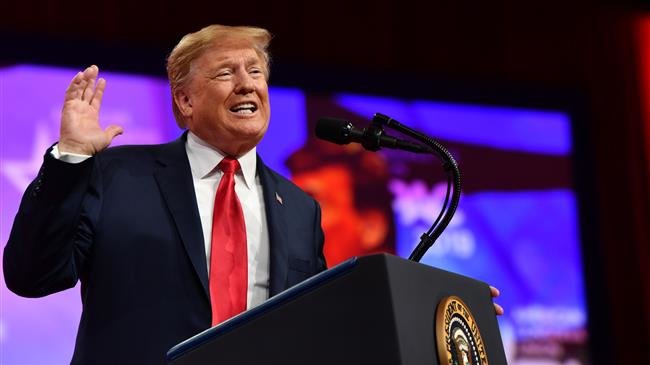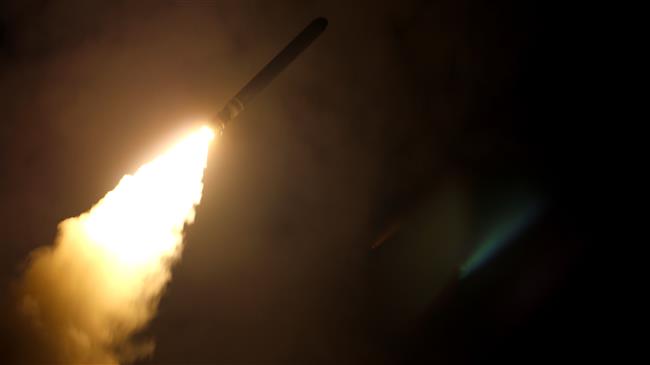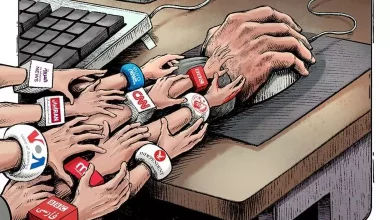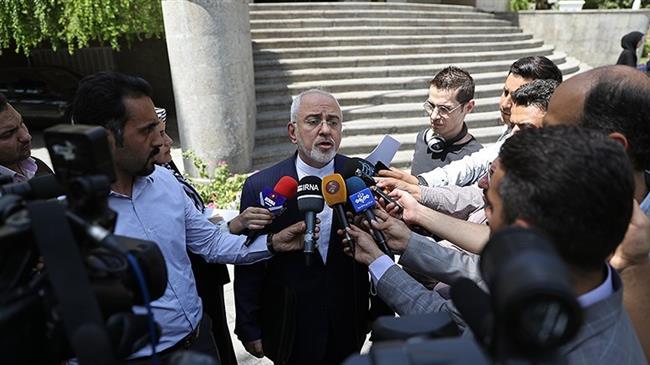North Korea has no economic future if it has nuclear weapons: Trump


US President Donald Trump says that North Korea has no economic future unless the two countries “make a deal” and the North discards its nuclear weapons.
Trump made the remarks at the annual Conservative Political Action Conference (CPAC) in Oxon Hill, Maryland, on Saturday in his first major public appearance since returning from his second summit with leader Kim Jong-un in Hanoi, Vietnam.
“North Korea has an incredible, brilliant economic future if they make a deal, but they don’t have any economic future if they have nuclear weapons,” Trump said.
“And a lot of what I do with respect to North Korea, and any success that we hopefully have – and we’ve had a lot, given no credit. They don’t remember that in the last days of the Obama administration, rockets were flying all over the place.”
Trump and Kim commenced their two-day summit over the so-called denuclearization of the Korean Peninsula on Wednesday. On Thursday, the second day of formal talks, both leaders expressed cautious optimism on reaching an agreement, and urged patience.
However, following the summit, Trump told reporters that “he had to walk away” from the talks because of the North’s demands to lift all economic sanctions against Pyongyang as a prerequisite to denuclearization.
“Basically, they wanted the sanctions lifted in their entirety, but we couldn’t do that … we had to walk away from it,” Trump said.
Trump slams Mueller, mocks critics
During his speech, Trump also attacked US Special Counsel Robert Mueller and said his political opponents were trying to take him out “with bullshit.”
His remarks came ahead of Mueller’s report on alleged Russian interference in the 2016 US presidential election.
“So now we’re waiting for a report, and we’ll find out … who we’re dealing with,” Trump said. “We’re waiting for a report by people that weren’t elected.”
“You put the wrong people in a couple of positions and they leave people for a long time that shouldn’t be there, and all of a sudden, they’re trying to take you out with bullshit, OK.”
In November, Trump announced that his personal legal team would compile a “major Counter Report” to Mueller’s findings.
Trump has repeatedly denied any collusion and has long called for end to the probe. Moscow has also denied any interference in US elections.
Strong dollar hurting US competitiveness
Trump renewed criticism of the Federal Reserve, saying the US central bank’s tight monetary policy was contributing to a strong dollar and thus hurting the country’s competitiveness.
“We have a gentleman that likes a very strong dollar at the Fed,” Trump said. “I want a strong dollar, but I want a dollar that’s great for our country not a dollar that is so strong that it is prohibitive for us to be dealing with other nations.”
Trump has taken the Federal Reserve and its chairman, Jerome Powell, who he named to head up the Fed, to task for raising interest rates.
The US central bank, which raised interest rates four times last year, has recently indicated it would be “patient” before it further tightens monetary policy.
That came in response to increasing concerns about the economic outlook amid financial markets volatility, slowing global growth and a trade war between the US and China.
“We have a gentleman in the Fed that loves quantitative tightening. We want a strong dollar, but let’s be reasonable,” Trump said. “Can you imagine if we left interest rates where they were …. if we didn’t do quantitative tightening, this would lead to a little bit lower dollar.”
A weaker currency generally results in a country’s exports being more competitive.
Trump vows executive order requiring ‘free speech’ at colleges
Trump said he would soon sign an executive order that would require American universities and colleges to allow “free speech” on campuses, threatening that those which do not comply could lose federal research funds.
“Today, I am proud to announce that I will be very soon signing an executive order requiring colleges and universities to support free speech if they want federal research funds,” Trump said during his speech at the annual CPAC.

If universities do not abide by the order, “it will be very costly,” he said. The US government awards universities over $30 billion in research funds per annum.
“We reject oppressive speech codes, censorship, political correctness, and every other attempt by the hard left to stop people from challenging ridiculous and dangerous ideas. These ideas are dangerous,” Trump said. “Instead we believe in free speech, including online and including on campus.”







